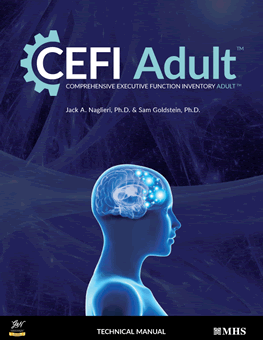
CEFI Adult
Comprehensive Executive Function Inventory Adult
Overview
Deficits in executive function can impair problem solving, reasoning, and adaptive behavior, making even the simplest tasks a challenge. CEFI Adult™ is a comprehensive assessment of executive function strengths and weaknesses for adults that delivers highly accurate results based on extensive norming. Intended to be used by professionals in clinical, educational, and research settings, this is ideal for assessing individuals with traumatic brain injuries (TBI), Alzheimer’s, Dementia, or ADHD. The CEFI Adult is an effective and reliable tool for evaluating executive function to guide diagnosis, intervention, and treatment planning, as well as to evaluate the success of an intervention program.
Key Features and Benefits
- Authored by Jack Naglieri, Ph.D, and Sam Goldstein, Ph.D, internationally recognized leaders in executive function assessment development
- Evaluates executive function strengths and weaknesses across nine different scales
- Self-Regulation (ASRS [6–18 Years] only)
- Provides scores you can trust with the most representative nationally standardized behavior rating scale of executive function in adults currently available
- Normative data represents the U.S. population
- Ensures understanding with an accessible fourth-grade reading level
- Provides observer and self-report ratings for a comprehensive evaluation of executive function
- Offers easy-to-understand reports with clear visuals and interpretations
Visit the Product Website
RSI™
Rating Scale of Impairment™
Sam Goldstein, Ph.D. & Jack A. Naglieri, Ph.D.
Description
With or without a diagnosis the RSI helps assess functional impairment across 6 important life areas.
The Purpose of the RSI
Authored by Sam Goldstein, Ph.D. and Jack A. Naglieri, Ph.D., the RSI is a multi-informant behavior rating scale that measures functional impairment across six life areas in children and youth. When used in combination with symptoms measures, the RSI adds impairment information that can help complete the diagnostic picture. It also helps to highlight where functional impairment is most prominent so that interventions can be more effectively targeted. When used in group settings the RSI can help identify those who require additional assessment, or measure the effectiveness of intervention programs.
Visit the Product Website
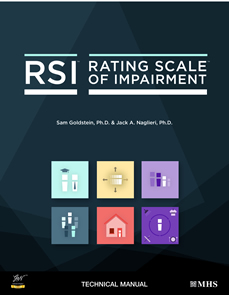
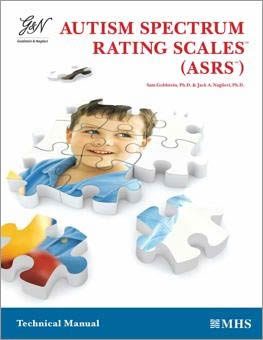
ASRS
The ASRS was designed to effectively identify symptoms, behaviors, and associated features of Autism Spectrum Disorders (ASDs) in children and adolescents aged 2 to 18.
This innovative instrument, authored by the highly respected Sam Goldstein, Ph.D., and Jack A. Naglieri, Ph.D., is a norm-referenced assessment based on a nationally representative sample, designed to identify symptoms, behaviors, and associated features of the full range of Autism Spectrum Disorders.
The ASRS scale is an easy-to-use and convenient tool intended for psychologists, school psychologists, clinical social workers, physicians, counselors, psychiatric workers, and pediatric/psychiatric nurses.
The ASRS will assist you in the diagnostic process. ASRS items assess DSM-IV-TR™ symptom criteria for ASDs. When used in combination with other assessment information, results from the ASRS can help guide your diagnostic decisions, treatment planning, ongoing monitoring of response to intervention, and evaluating the effectiveness of a treatment program for a child with an ASD.
Download PDF product overview (click here)
View product web page (click here)
How to Use the Assessment
Using a five-point Likert rating scale, parents and teachers are asked to evaluate how often they observed specific behaviors in the child or adolescent in areas such as socialization, communication, unusual behaviors, behavioral rigidity, sensory sensitivity, and self-regulation.
You can choose between two versions: ASRS (2–5 Years) for ratings of children aged 2 to 5 and ASRS (6–18 Years) for ratings of children or adolescents aged 6 to 18. The ASRS can be easily and quickly completed and scored automatically with the ASRS online from any Internet connection. The ASRS can also be scored using the ASRS Scoring Software simply be entering responses from a completed paper-and-pencil administration into the software (ratings from paper-and pencil forms can also be scored online). Paper-and-pencil administrations on ASRS Quikscore forms can be scored by hand.
There is also a 15-item ASRS Short form available. The ASRS Short form provides an efficient way to screen large numbers of children for possible ASD and can be used for monitoring treatment progress.
ASRS Scales
- Social/Communication
- Unusual Behaviors
- Self-Regulation (ASRS [6–18 Years] only)
Treatment Scales
- Peer Socialization
- Adult Socialization
- Social/Emotional Reciprocity
- Atypical Language
- Stereotypy
- Behavioral Rigidity
- Sensory Sensitivity
- Attention/Self-Regulation (ASRS [2–5 Years] only)
- Attention (ASRS [6–18 Years] only)
Visit the Product Website
CEFI™
Comprehensive Executive Function Inventory™
Jack A. Naglieri, Ph.D., and Sam Goldstein, Ph.D.
Description
The CEFI™ is a comprehensive evaluation of executive function strengths and weaknesses in youth aged 5 to 18 years.
The Purpose of the CEFI
The CEFI is a versatile instrument that can be used to evaluate an individual, using standard scores to compare the youth to a nationally representative norm group. This information can ultimately be used to guide assessment, diagnosis, and treatment planning. The CEFI is also useful in a variety of research contexts and can be used as an effective tool to evaluate the success of an intervention program.
How the CEFI Works
Authored by Jack. A. Naglieri, Ph.D., and Sam Goldstein, Ph.D., the CEFI is the most representative nationally standardized behavior rating scale of executive function. Reliability and validity data indicate it has strong psychometric qualities. With 100 items on a Likert-type scale -90 are distributed among the CEFI scales and 10 on the Positive and Negative Impression Scales – the CEFI offers Parent, Teacher, and Self-Report (12 to 18 years) Forms, allowing for a multi-rater perspective of a youth’s executive function. The CEFI can be administered online, via email, or with paper.
Following administration, all CEFI forms can be scored using the MHS QuikScore™ Format, MHS Scoring Software, or online. There are three types of reports that can be generated from all forms: the Interpretive Report (provides detailed results from one administration), the Progress Monitoring and Treatment Effectiveness Report (provides an evaluation of CEFI score changes over time for up to four administrations from the same rater), and the Comparative report (provides an analysis of scores from two to five different raters).
Intended for use by professionals such as psychologists, school psychologists, clinical social workers, physicians, counselors, psychiatric workers, and pediatric/psychiatric nurses, the CEFI is an effective and reliable tool for evaluating executive function.
The CEFI was developed to measure a wide spectrum of behaviors associated with executive function. In addition to a Full Scale score, calculated by adding responses to 90 of the items, the CEFI utilizes nine scales to pinpoint targets for intervention.
To download a .pdf version of the CEFI Product Overview, (click here)
View product web page (click here)
Scales & Forms
The scales used in the CEFI have been developed to measure a wide spectrum of behaviors associated with executive functioning. The scores which emerge from these scales are based upon a nationally representative normative sample (aged 5 to 18 years) of a diverse group of individuals.
In addition to a Full Scale Score calculated by adding responses to 90 of the items, the CEFI utilizes nine rationally-derived scales to pinpoint targets for intervention:
Scales:
- Attention – measures how well a youth can avoid distractions, concentrate on tasks, and sustain attention
- Emotion Regulation – measures a youth’s control and management of emotions
- Flexibility – describes how well a youth can adapt to circumstances, including problem solving ability
- Inhibitory Control – reflects a youth’s control over behavior or impulses
- Initiation – describes a youth’s ability to begin tasks or projects without being prompted
- Organization – describes how well a youth manages personal effects, work, or multiple tasks
- Planning – reflects how well a youth develops and implements strategies to accomplish tasks
- Self-Monitoring – describes a youth’s self-evaluation of his/her performance or behavior
- Working Memory – measures how a youth keeps important information in mind in order that he/she know what to do and how to do it, including remembering important things, instructions, and steps
Visit the Product Website
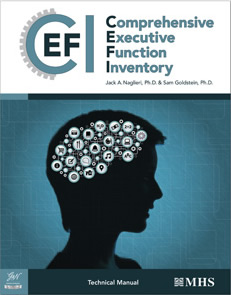
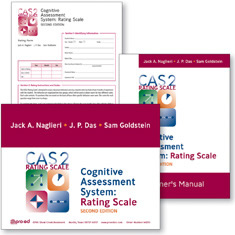
CAS2: Rating Scale - Complete Kit
The CAS2: Rating Scale is a norm-referenced measure of behaviors related to cognitive / neuropsychological theory called PASS (Planning, Attention, Simultaneous, and Successive) completed by teachers.
The rating scale provides scores for Planning, Attention, Simultaneous, and Successive scales as well as a Total Score. Each PASS Scale as well as the CAS2 Full Scale yields a percentile rank and standard score with a mean of 100 and a standard deviation of 15.
The scores from the CAS2: Rating Scale can be used to (a) support a referral, supportive services, or special placements, (b) supplement a comprehensive evaluation, (c) compare teachers’ ratings with test results, (d) help plan and design academic interventions by revealing behaviors and skills the teacher considers problematic or lacking, and (e) monitor the effectiveness of interventions. Results are particularly useful when used as part of a comprehensive evaluation or as a pre-referral/referral tool.
Technical Characteristics
The CAS2: Rating Scale was standardized using a group of 1,383 children and adolescents that closely represent the population of the U.S. Extensive reliability and validity information is reported in the Examiner’s Manual. Coefficient alpha reliability coefficients range from .93 to .98. Validity studies include an investigation its diagnostic accuracy as it relates to its sensitivity, specificity, classification accuracy, and receiver operating characteristic/area under the curve (ROC/AUC).
View product web page (click here)
Visit the Product Website
CAS2: Cognitive Assessment System–Second Edition (with case)
The Cognitive Assessment System–Second Edition (CAS2) is a well-researched, norm-referenced measure of cognitive ability based on the well-researched cognitive/neuropsychological theory called PASS (Planning, Attention, Simultaneous, and Successive).
Ages: 5 through 18 years
Testing time: 40 to 60 minutes
Administration: Individual
The CAS2 was designed to measure cognitive processing abilities important for a broad range of differential diagnoses and instructional planning in individuals ages 5-0 through 18-11. CAS2 provides practitioners with a valid and reliable tool to evaluate children’s strengths and weaknesses in important areas of cognitive processing.
CAS2 Scores
The CAS2 Extended Battery has three subtests in each of the four PASS scales. The Core Battery includes two subtests from each of the four PASS scales. Each PASS scale as well as the CAS2 Full Scale yields a standard score with a mean of 100 and a standard deviation of 15.
View product web page (click here)
Visit the Product Website
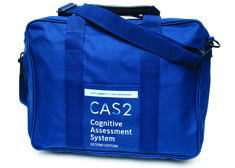
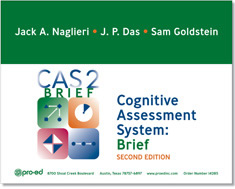
CAS2: Brief Complete Kit
The CAS2: Brief is a norm-referenced measure of cognitive ability based on the well-researched cognitive/neuropsychological theory called PASS (Planning, Attention, Simultaneous, and Successive).
PASS abilities are evaluated using four subtests (Planned Codes, Simultaneous Matrices, Expressive Attention, and Successive Digits) which are combined to yield a Total Score. Each subtest yields a scaled score based on a mean of 10 and a standard deviation of 3. The sum of scaled scores can be converted a percentile rank and index score with a mean of 100 and a standard deviation of 15.
The CAS2: Brief provides practitioners with a brief but valid and reliable tool to examine children and adolescent’s strengths and weaknesses in important areas of cognitive processing. The CAS2: Brief was designed to be used whenever a fast, reliable, research-based measure is needed to evaluate PASS cognitive abilities. This would include initial testing to measure overall ability and examination of variability in PASS scores to determine possible implications for intervention.
View product web page (click here)
Visit the Product Website
ADHD ASSESSMENT with Gear VR
Virtual Reality Assessment for Attention Deficit Hyperactivity Disorder.
Co-Developed with Dr. Sam Goldstein
AULA is the first well developed, norm referenced, virtual reality measure to evaluate attention, vigilance, impulse control and activity level in a simulated classroom. The test runs into a Samsung Virtual Reality system comprised by a Samsung VR glasses and a Samsung Galaxy S6 edge+ mobile phone that provides high accuracy on all the measurements tracked by AULA, and simplifies the use of the tool.
Visit the Product Website